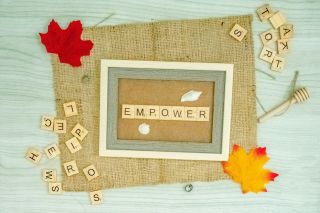Boundaries
How to Say No and Feel Good About It
Boundaries are an empowering and essential component of self-care.
Posted January 25, 2024 Reviewed by Michelle Quirk
Key points
- Boundaries allow us to maintain a sense of self while connecting with others.
- Without boundaries, we may feel overwhelmed, burned out, or resentful, leading to unfulfilling relationships.
- Our relationships benefit because honoring our limits helps build genuine connections based on mutual respect.

One of the most challenging aspects of interpersonal relationships is balancing our needs with those of others. Many of us find ourselves trapped by obligations, often sacrificing our own well-being to please others because guilt prevents us from saying no. This post explores the importance of establishing interpersonal boundaries, overcoming guilt associated with saying no, and experiencing boundary-setting as an empowering form of self-care. You'll learn how to feel good about setting boundaries, knowing that boundaries help us care for ourselves and build healthy connections.
The Benefits of Setting Boundaries
Boundaries are like invisible fences that define our personal space and emotional limits. They serve as the foundation for healthy relationships, allowing individuals to maintain a sense of self while connecting with others. Without clear boundaries, you may feel overwhelmed, burnt out, or resentful, leading to conflict and unfulfilling relationships. Saying no allows us to use our time and energy on activities and goals that truly matter to us. This, in turn, contributes to increased productivity, better mental health, and a more fulfilling life.
Setting boundaries is an act of self-love and self-respect. It communicates to others that you value your well-being and have a clear understanding of your own needs. Moreover, boundaries create clear expectations, which help relationships function smoothly. Healthy connections are built on mutual support and acknowledgment of each other's limitations.
Why We Feel Guilty When We Say No
Feelings of guilt are a common barrier to setting boundaries. “Guilt is the feeling you have when you think you’ve done something wrong. So, when you feel guilty about setting boundaries, it’s because you don’t think you have the right to protect yourself, say no, have your own ideas, or ask for something” (Martin, 2021).
Saying no is especially challenging if you grew up in a dysfunctional family or have codependent tendencies. Setting boundaries can seem like breaking the rules—like you're doing something bad or selfish. You might even feel like you're betraying your family or letting them down when you say no or tend to your own needs.
This is because growing up in such an environment often means putting others' needs before your own. As I explain in The Better Boundaries Workbook, a dysfunctional family can send the message that “…you aren’t important and don’t deserve to be treated well, your needs or feelings don’t matter or should come second, [and] you shouldn’t ask for anything (and if you do, you won’t get it or will be ignored for shamed for asking)” (Martin, 2021).
It’s natural and understandable to want to please others. However, if you grew up in or have had relationships that were emotionally reactive or didn’t allow you to have your own opinions, you may be conflict-avoidant. As a result, you may feel guilty when you set boundaries because you’re afraid of displeasing or angering others or perhaps even afraid that they’ll reject or abandon you.
Overcome Guilt When Setting Boundaries
To reduce feelings of guilt, it’s helpful to remember that saying no isn’t about rejecting others but prioritizing oneself. Setting boundaries is about acknowledging personal limits and honoring your need for self-care. Keep in mind that everyone needs and deserves self-care. It’s not wrong to consider your needs and take steps to meet them. Self-care is how we maintain good physical and mental health.
Try these tips for setting boundaries without guilt:
- Express gratitude and appreciation. Acknowledge the request and thank the person for thinking of you. This shows respect and softens the blow of your declination. Example: "Thanks so much for asking me to help with [request]. Although I can't help, I appreciate you thinking of me."
- Be clear and concise in your refusal. State your "no" clearly and directly; avoid justifying or apologizing. This conveys confidence and prevents misinterpretations. Example: "Unfortunately, I can't commit to that right now."
- Offer an alternative or compromise, if appropriate. Suggesting another way you could be of assistance shows your willingness to contribute while maintaining your boundaries. When doing this, be mindful that you’re not compromising to avoid guilt or conflict; do it only if the alternative truly works for you. Example: "I can’t help with [request], but I could contribute [alternative]."
- Focus on your own needs and priorities. Remind yourself that it's OK to prioritize your time and energy. You have the right to say no if something doesn't align with your values and priorities or will negatively impact your well-being. Example: "I need to focus on [your own commitment] right now, so I won't be able to help."
- Practice. Saying no can feel uncomfortable at first, but it gets easier with practice. Start with small refusals and gradually build your confidence. Remember, the more you do it, the less guilt you'll feel.
- Shift the framing from "no" to "self-care.” Instead of viewing saying "no" as a negative, reframe it as a positive commitment to your own well-being. This perspective can help reduce guilt and self-doubt. Example: "I need to prioritize my self-care right now and can’t help you out."
Feel Good About Setting Boundaries
Boundaries are a form of self-empowerment. They demonstrate that you value yourself enough to prioritize your needs and live in alignment with your values and goals, which contributes to a more fulfilling and authentic life.
Consider boundaries a win-win situation. You gain more time and energy for things that bring you joy, whether it's starting a personal project, spending a relaxing evening with loved ones, or simply getting some well-deserved rest. And your relationships benefit because honoring your limits helps build genuine connections based on mutual respect.
In short, boundaries empower you to navigate life on your terms, allowing you to take care of yourself and feel good about it.
References
Martin, S. (2021). The Better Boundaries Workbook. Oakland, CA: New Harbinger Publications.




